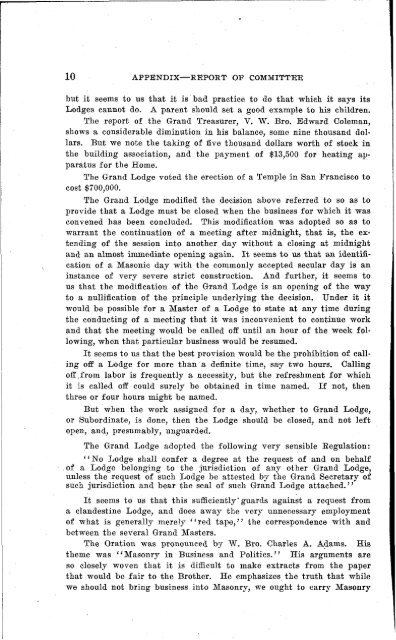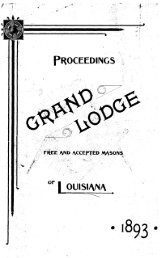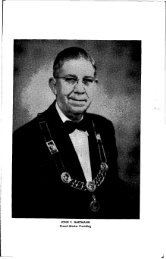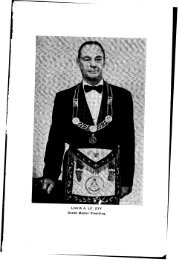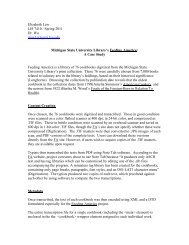- Page 1 and 2:
E. H. ADDINGTON GRAND MASTER 1912
- Page 3 and 4:
FORMATION OF THE GRAND LODGE OF LOU
- Page 5 and 6:
STATE OF LOUISIANA 5 PEESENTS First
- Page 7 and 8:
CENTENNIAL CELEBRATION, GRAND LODGE
- Page 9 and 10:
GRAND LODGE F. AND A. M. OF LOUISIA
- Page 11 and 12:
GRAND LODGE F. AND A. M. OF LOUISIA
- Page 13 and 14:
GRAND LODGE F. AND A. M. OF LOUISIA
- Page 15 and 16:
GRAND LODGE F. AND A. M. OF LOUISIA
- Page 17 and 18:
GRAND LODGE F. AND A. M. OF LOUISIA
- Page 19 and 20:
GRAND LODGE F. AND A. M. OF LOUISIA
- Page 21 and 22:
GRAND LODGB P. AND A. M. OF LOUISIA
- Page 23 and 24:
GRAND LODGE F. AND A. M. OF LOUISIA
- Page 25 and 26:
GRAND LODGE F. AND A. M. OF LOUISIA
- Page 27 and 28:
GRAND LODGE F. AND A. M. OF LOUISIA
- Page 29 and 30:
GRAND LODGE P. AND A.' M. OF LOUISI
- Page 31 and 32:
GRAND LODGE F. AND A. M. OF LOUISIA
- Page 33 and 34:
"Benevolence is a virtue, which spr
- Page 35 and 36:
GRAND LODGE F. AND A. M. OF LOUISIA
- Page 37 and 38:
GRAND LODGE F. AND A. M. OF LOUISIA
- Page 39 and 40:
GRAND LODGE F. AND A. M. OF LOUISIA
- Page 41 and 42:
GRAND LODGE F. AND A. M. OF LOUISIA
- Page 43 and 44:
GRAND LODGE F. AND A. M. OF LOUISIA
- Page 45 and 46:
GRAND LODGE F. AND A. M OF LOUISIAN
- Page 47 and 48:
GRAND LODGE F. AND A. M. OP LOUISIA
- Page 49 and 50:
FIRST DAY'S SESSION SCOTTISH EITE C
- Page 51 and 52:
OF THE STATE OF LOUISIANA. 51 FELIC
- Page 53 and 54:
OP THE STATE OF LOUISIANA. 53 DOWNS
- Page 55 and 56:
OF THE STATE OF LOUISIANA. , 55 CAD
- Page 57 and 58:
OF THE STATE OF LOUISIANA. 57 DOBCH
- Page 59 and 60:
\ OF THE STATE OF LOUISIANA. 59 IDA
- Page 61 and 62:
OP THE STATE OF LOUISIANA. 61 ADDRE
- Page 63 and 64:
OF THE STATE OF LOUISIANA. 63 Broth
- Page 65 and 66:
OF THE STATE OF LOUISIANA. 65 desir
- Page 67 and 68:
OF THE STATE OF LOUISIANA. 67 TEMPL
- Page 69 and 70:
OF THE STATE OF LOUISIANA. 69 On Fe
- Page 71 and 72:
OF THE STATE OF LOUISIANA. 71 of a
- Page 73 and 74:
OF THE STATE OF LOUISIANA. i3 Broth
- Page 75 and 76:
OF THE STATE OP LOUISIANA. 75 DISPE
- Page 77 and 78:
OF THE STATE OF LOUISIANA. 77 rooms
- Page 79 and 80:
OF THE STATE OF LOUISIANA. 79 RULIN
- Page 81 and 82:
OP THE STATE OF LOUISIANA. 81 OFFIC
- Page 83 and 84:
OF THE STATE OF LOUISIANA. 83 bodie
- Page 85 and 86:
OF THE STATE OF LOUISIANA. 85 the n
- Page 87 and 88:
OF THE STATE OF LOUISIANA. 87 It se
- Page 89 and 90:
OF THE STATE OP LOUISIANA. 89 Were
- Page 91 and 92:
OP THE STATE OF LOUISIANA. 91 aroun
- Page 93 and 94:
OF THE STATE OF LOUISIANA. . 93 to
- Page 95 and 96:
OF THE STATE OF LOUISIANA. 95 R. W.
- Page 97 and 98:
OF THE STATE OP LOUISIANA. 97 ROLL
- Page 99 and 100:
OF THE STATE OF LOUISIANA. 99 REPOR
- Page 101 and 102:
OP THE STATE OF LOUISIANA. 101 LODG
- Page 103 and 104:
OF THE STATE OF LOUISIANA. 103 Febr
- Page 105 and 106:
OF THE STATE OF LOUISIANA. 105 EXPE
- Page 107 and 108:
OP THE STATE OF LOUISIANA. 107 MEMB
- Page 109 and 110:
OF THE STATE OF LOUISIANA. 109 tota
- Page 111 and 112:
OF THE STATE OF LOUISIANA. Ill peri
- Page 113 and 114:
OP THE STATE OF LOUISIANA. 113 Illi
- Page 115 and 116:
OF THE STATE OF LOUISIANA. 115 Unit
- Page 117 and 118:
OF THE STATE OF LOUISIANA. 117 Libe
- Page 119 and 120:
OF THE STATE OF LOUISIANA. 119 REPO
- Page 121 and 122:
OF THE STATE OF LOUISIANA. 121 Eefe
- Page 123 and 124:
OF THE STATE OF LOUISIANA. 123 TRIA
- Page 125 and 126:
OF THE STATE OF LOUISIANA. . 125 Th
- Page 127 and 128:
OP fHE STATE OF LOUISIANA. 127 If t
- Page 129 and 130:
OF THE STATE OP LOUISIANA. 129 advi
- Page 131 and 132:
OF THE STATE OF LOUISIANA. 131 The
- Page 133 and 134:
OF THE STATE OF LOUISIANA. ' 133 up
- Page 135 and 136:
OF THE STATE OF LOUISIANA. 135 in m
- Page 137 and 138:
OF THE STATE OF LOUISIANA. PLAN 1.
- Page 139 and 140:
OF THE STATE OF LOUISIANA. PLAN 3.
- Page 141 and 142:
OF THE STATE OF LOUISIANA. . 141 We
- Page 143 and 144:
OMISSION. . UNFINISHED BUSINESS. R.
- Page 145 and 146:
144 PROCEEDINGS OF THE GRAND LODGE
- Page 147 and 148:
146 PROCEEDINGS OF THE GRAND LODGE
- Page 149 and 150:
148 PROCEEDINGS OF THE GRAND LODGE
- Page 151 and 152:
150 PROCEEDINGS OF THE GRAND LODGE
- Page 153 and 154:
152 PROCEEDINGS OF THE GRAND LODGE
- Page 155 and 156:
154 PROCEEDINGS OF THE GRAND LODGE
- Page 157 and 158:
156 PROCEEDINGS OF THE GRAND LODGE
- Page 159 and 160:
158 PROCEEDINGS OF THE GRAND LODGE
- Page 161 and 162:
160 PROCEEDINGS OP THE GRAND LODGE
- Page 163 and 164:
162 PROCEEDINGS OF THE GRAND LODGE
- Page 165 and 166:
164 PROCEEDINGS OF THE GRAND LODGE
- Page 167 and 168:
166 PROCEEDINGS OF THE GRAND LODGE
- Page 169 and 170:
168 PROCEEDINGS OF THE GRAND LODGE
- Page 171 and 172:
170 PROCEEDINGS OF THE GRAND LODGE
- Page 173 and 174:
172 PROCEEDINGS OF THE GRAND LODGE
- Page 175 and 176:
174 .PROCEEDINGS OF THE GRAND LODGE
- Page 177 and 178:
176 PROCEEDINGS OF THE GRAND LODGE
- Page 179 and 180:
178 PROCEEDINGS OF THE GRAND LODGE
- Page 181 and 182:
180 PROCEEDINGS OF THE GRAND LODGE
- Page 183 and 184:
182 WORK AND RETURNS OF Gregory, F.
- Page 185 and 186:
184 WORK AND RETURNS OP PERSEVERANC
- Page 187 and 188:
186 WORK AND RETURNS OF Kohler, Ira
- Page 189 and 190:
188 \*[ORK AND RETURNS OF ST. ALBAN
- Page 191 and 192:
190 WORK AND RETURNS OP GERMANIA LO
- Page 193 and 194:
192 WORE AND RETURNS OF Amber, Osca
- Page 195 and 196:
194 WORK. AND RETURNS OF Pratt, W.
- Page 197 and 198:
196 WORK AND RETURNS OP Initiated,
- Page 199 and 200:
198 WORK AND RETURNS OF GEORGE WASH
- Page 201 and 202:
200 WORK AND RETURNS OF Testard, H.
- Page 203 and 204:
202 WORK AND RETURNS OF Tramel, T.
- Page 205 and 206:
204 WORK AND RETURNS OF J. W. Peek,
- Page 207 and 208:
206 WORK AND RETURNS OF LAFAYETTE L
- Page 209 and 210:
208 WORK AND RETURNS OF Jones, G. M
- Page 211 and 212:
210 WORK AND RETURNS OP Mixon, T. E
- Page 213 and 214:
212 WORK AND RETURNS OF Wellborn, M
- Page 215 and 216:
214 WORK AND RETURNS OF HARRISONBUR
- Page 217 and 218:
216 WORK AND RETURNS OF Initiated,
- Page 219 and 220:
218 . WORK AND RETURNS OF MEMBERS.
- Page 221 and 222:
220 WORK AND RETURNS OF Allen, J. W
- Page 223 and 224:
222 WORK AND RETURNS OF R. W. Baker
- Page 225 and 226:
224 WORK AND RETURNS OP Gregory, F.
- Page 227 and 228:
226 WORK AND RETURNS OF EASTERN STA
- Page 229 and 230:
228 WORK AND RETURNS OF SAINTS JOHN
- Page 231 and 232:
230 WORK AND RETURNS OF Albee, F. A
- Page 233 and 234:
232 WORK AND RETURNS OF Howe, E. S.
- Page 235 and 236:
234 WORK AND RETURNS OF LINN WOOD L
- Page 237 and 238:
236 WORK AND RETURNS OF Reinstated
- Page 239 and 240:
238 WORK AND RETURNS OF Bernius. Hy
- Page 241 and 242:
240 WORK AND RETURNS OF Colletti, R
- Page 243 and 244:
242 WORK AND RETURNS OF Sempe,.J. P
- Page 245 and 246:
244 WORK AND RETURNS OF PAST MASTER
- Page 247 and 248:
246 WORK AND RETURNS OF Payne, Walt
- Page 249 and 250:
248 WORK ANt> RETURNS OF Weil, Emil
- Page 251 and 252:
250 WORK AND RETURNS OP Bernhart, J
- Page 253 and 254:
252 WORK AND RETURNS OF D M. Holton
- Page 255 and 256:
254 WORK AND RETURNS OF LAND MARK L
- Page 257 and 258:
256: WORK AND RETURNS OF Anderson,
- Page 259 and 260:
258 WORK AND RETURNS OF GRANGEVILLE
- Page 261 and 262:
260 WORK AND RETURNS OF ROBERTSVILL
- Page 263 and 264:
262 WORK AND RETURNS OF MEMBERS. Ar
- Page 265 and 266:
264 WORK AND RETURNS OF Howard, D.
- Page 267 and 268:
266 WORK AND RETURNS OF Loeb, A. S.
- Page 269 and 270:
268 WORK AND RETURNS OF WINNSBORO L
- Page 271 and 272:
270 WORK AND RETURNS OF JENNINGS LO
- Page 273 and 274:
272 WORK AND EBTUENS OP Langbecker,
- Page 275 and 276:
274 WORK AND RETURNS OF Melder, P.
- Page 277 and 278:
276 WORK AND RETURNS OF Bailes, L.
- Page 279 and 280:
278 WORK AND RETURNS OF ANCHOR LODG
- Page 281 and 282:
280 WORK AND RETURNS OF House, Ezek
- Page 283 and 284:
282 WORK AND RETURNS OF Abbott, Wal
- Page 285 and 286:
284 WORE AND RETURNS OF DERIDDER LO
- Page 287 and 288:
286 WORK AND RETURNS OF OBERLIN LOD
- Page 289 and 290:
288 WORK AND RETURNS OP ROSEMARY LO
- Page 291 and 292:
290 WORK AND RETURNS OF R. M. CROWS
- Page 293 and 294:
292 WORK AND RETURNS OF OAK GROVE L
- Page 295 and 296:
294 WORK AND RETURNS OP PINE GROVE
- Page 297 and 298:
296 WORK AND RETURNS OP FORDOCHE LO
- Page 299 and 300:
298 WORK AND RETURNS OF Patterson,
- Page 301 and 302:
300 WORK AND RETURNS OF OSIRIS LODG
- Page 303 and 304:
302 WORK AND RETURNS OF • ZWOLLE
- Page 305 and 306:
304 WORK ANb RETURNS OF Kahn, Abrah
- Page 307 and 308:
306 . WORK AND RETURNS OP PAST MAST
- Page 309 and 310:
308 WORK AND RETURNS OF VIVIAN LODG
- Page 311 and 312:
310 WORK AND RETURNS OF Dean, Chas.
- Page 313 and 314:
312 WORK AND RETURNS OF J. W. Phare
- Page 315 and 316:
314 WORK AND RETURNS OF LAKE END LO
- Page 317 and 318:
316 WORK AND RETURNS OF MEEEYVILLE
- Page 319 and 320:
318 WORK AND RETURNS OF ROYAL LODGE
- Page 321 and 322:
320 WORK AND RETURNS OF PAST MASTER
- Page 323 and 324:
322 WORK AND RETURNS OF Loucks, A.
- Page 325 and 326:
324 WORK AND RETURNS OF MEMBERS. Bo
- Page 327 and 328:
326 WORK AND RETURNS OF LOUISIANA R
- Page 329 and 330:
328 GRAND MASONIC BODIES OF LOUISIA
- Page 331 and 332:
330 COMMITTEES OP GRAND LODGE. •
- Page 333 and 334:
332 DISTRICT DEPUTY GRAND MASTERS.
- Page 335 and 336:
334 DISTRICT DEPUTY GRAND MASTERS.
- Page 337 and 338:
LODGES FORMING THE GRAND LODGE OF L
- Page 339 and 340:
NAMES OF LODGES. 51 Western Star ,
- Page 341 and 342:
NAMES OF LODGES. 117 Sparta 118 Cas
- Page 343 and 344: NAMES OF LODGES. 180 Kosmos.. 181 U
- Page 345 and 346: d & NAMES OF LODGES. a _6 245 Littl
- Page 347 and 348: 346 HISTORICAL TABLE OF LODGES. CO
- Page 349 and 350: 348 ALPHABETICAL LIST OF LODGES. AL
- Page 351 and 352: 350 ALPHABETICAL LIST OF LODGES. I
- Page 353 and 354: 352 ALPHABETICAL LIST OF LODGES. AL
- Page 355 and 356: 354 ALPHABETICAL LIST OK LOCATION.
- Page 357 and 358: List of Fast and Present Grand Offi
- Page 359 and 360: LIST OF PAST AND PRESENT GRAND OFFI
- Page 361 and 362: GRAND LODGE Maryland Michigan Minne
- Page 363 and 364: 362 NAMES AND ADDRESSES OF GRAND SE
- Page 365 and 366: Register and Work of Lodges under t
- Page 367 and 368: A fa o a i Q 366 REGISTER AND WORK
- Page 369 and 370: o 368 REGISTER AND WORK OF LODGES.
- Page 371 and 372: DECEASED BRETHREN OF SISTER GRAND L
- Page 373 and 374: PAST MASTERS MEMBERS OF THE GRAND L
- Page 375 and 376: DECEASED BRETHREN OF 1111 CONSTITUE
- Page 377 and 378: w G. DAVIS FKANKLIN LODGE MO. 57 FB
- Page 379 and 380: SAINTS JOHN LODGE NO. 153 HENRY PER
- Page 381 and 382: WELSH LODGE NO. 232 NAT. PRENTICE M
- Page 383 and 384: YELLOW PINE LODGE NO. 282 OEEIN F.
- Page 385 and 386: APPENDIX. REPORT ON FOREIGN CORRESP
- Page 387 and 388: ON FOREIGN CORRESPONDENCE. 3 with c
- Page 389 and 390: ON FOREIGN CORRESPONDENCE. 5 The Gr
- Page 391 and 392: ON FOREIGN CORRESPONDENCE. 7 He int
- Page 393: ON FOREIGN CORRESPONDENCE. 9 As to
- Page 397 and 398: ON FOREIGN CORRESPONDENCE. 13 dress
- Page 399 and 400: ON FOREIGN CORRESPONDENCE. 15 claim
- Page 401 and 402: ON FOREIGN CORRESPONDENCE. 1? May w
- Page 403 and 404: ON FOREIGN CORRESPONDENCE. 19 Lodge
- Page 405 and 406: ON FOREIGN CORRESPONDENCE. 21 The r
- Page 407 and 408: ON FOREIGN CORRESPONDENCE. 23 ILLIN
- Page 409 and 410: ON FOREIGN CORRESPONDENCE. 25 He th
- Page 411 and 412: ON FOREIGN CORRESPONDENCE. 27 of th
- Page 413 and 414: ON FOREIGN CORRESPONDENCE. 29 IRELA
- Page 415 and 416: ON FOREIGN CORRESPONDENCE. 31 for t
- Page 417 and 418: ON FOREIGN CORRESPONDENCE. 33 to th
- Page 419 and 420: ON FOREIGN CORRESPONDENCE. 35 The c
- Page 421 and 422: ON FOREIGN CORRESPONDENCE. 37 draw
- Page 423 and 424: ON FOREIGN CORRESPONDENCE. 39 the d
- Page 425 and 426: ON FOREIGN CORRESPONDENCE. 41 well
- Page 427 and 428: ON FOREIGN CORRESPONDENCE. 43 in wh
- Page 429 and 430: ON FOREIGN CORRESPONDENCE. 45 cost
- Page 431 and 432: ON FOREIGN CORRESPONDENCE. 47 sound
- Page 433 and 434: v ON FOREIGN CORRESPONDENCE. 49 are
- Page 435 and 436: ON FOREIGN CORRESPONDENCE. 51 We fi
- Page 437 and 438: ON FOREIGN CORRESPONDENCE. 53 Much
- Page 439 and 440: ON FOREIGN CORRESPONDENCE. 55 upon
- Page 441 and 442: ON FOREIGN CORRESPONDENCE. 57 of di
- Page 443 and 444: ON FOREIGN CORRESPONDENCE. 59 with
- Page 445 and 446:
ON FOREIGN CORRESPONDENCE. 61 fulne
- Page 447 and 448:
ON FOREIGN CORRESPONDENCE. 63 The G
- Page 449 and 450:
ON FOREIGN CORRESPONDENCE. 65 has b
- Page 451 and 452:
ON FOREIGN CORRESPONDENCE. 67 vasio
- Page 453 and 454:
ON FOREIGN CORRESPONDENCE. 69 Fello
- Page 455 and 456:
ON FOREIGN CORRESPONDENCE. 71 union
- Page 457 and 458:
ON FOREIGN CORRESPONDENCE. 73 '' Th
- Page 459 and 460:
ON FOREIGN CORRESPONDENCE. 75 ' The
- Page 461 and 462:
ON FOREIGN CORRESPONDENCE. 77 The G
- Page 463 and 464:
ON FOREIGN CORRESPONDENCE. 79 SOUTH
- Page 465 and 466:
ON FOREIGN CORRESPONDENCE. 81 Maste
- Page 467 and 468:
ON FOREIGN CORRESPONDENCE. 83 N "Qu
- Page 469 and 470:
ON FOREIGN CORRESPONDENCE. 85 to pr
- Page 471 and 472:
ON FOREIGN CORRESPONDENCE. 87 The r
- Page 473 and 474:
ON FOREIGN CORRESPONDENCE. 89 and f
- Page 475 and 476:
ON FOREIGN CORRESPONDENCE. 91 But a
- Page 477 and 478:
ON FOREIGN CORRESPONDENCE. 93 to sm
- Page 479 and 480:
ON FOREIGN CORRESPONDENCE. 95 Grand
- Page 481 and 482:
ON FOREIGN CORRESPONDENCE. 97 was n
- Page 483 and 484:
ON FOREIGN CORRESPONDENCE. '99 of o
- Page 485 and 486:
ON FOREIGN CORRESPONDENCE. 101 At o
- Page 487 and 488:
ON FOREIGN CORRESPONDENCE. 103 this
- Page 489 and 490:
ON FOREIGN CORRESPONDENCE. 105 We s
- Page 491 and 492:
OUTLI N E OF THE RISE AND PROGRESS
- Page 493 and 494:
OF FREEMASONRY IN LOUISIANA. _ 3 wh
- Page 495 and 496:
OF FREEMASONRY IN LOUISIANA. 5 Orie
- Page 497 and 498:
OF FREEMASONRY IN LOUISIANA. 7 offi
- Page 499 and 500:
OF FREEMASONRY IN LOUISIANA. 9 arri
- Page 501 and 502:
' OF FREEMASONRY IN LOUISIANA. 11 T
- Page 503 and 504:
OF FREEMASONRY IN LOUISIANA. 13 aff
- Page 505 and 506:
OP FREEMASONRY IN LOUISIANA. IS The
- Page 507 and 508:
OF FREEMASONRY IN LOUISIANA. 17 It
- Page 509 and 510:
OF FREEMASONRY IN LOUISIANA. 19 3.
- Page 511 and 512:
OF FREEMASONRY IN LOUISIANA. 21 The
- Page 513 and 514:
OF FREEMASONRY IN LOUISIANA. 23 Hav
- Page 515 and 516:
OF FREEMASONRY IN LOUISIANA. 25 CHA
- Page 517 and 518:
OF FRBEMASONRY IN LOUISIANA. the du
- Page 519 and 520:
OF FREEMASONRY IN LOUISIANA. 29 but
- Page 521 and 522:
OF FREEMASONRY IN LOUISIANA. 31 It
- Page 523 and 524:
OS FREEMASONRY IN LOUISIANA. 33 The
- Page 525 and 526:
OF FREEMASONRY IN LOUISIANA. 35 Not
- Page 527 and 528:
OF FREEMASONRY IN LOUISIANA. 37 and
- Page 529 and 530:
OF FREEMASONRY IN LOUISIANA. 39 all
- Page 531 and 532:
OF FREEMASONR.Y IN LOUISIANA. 41 A
- Page 533 and 534:
OF FREEMASONRY IN LOUISIANA. 43 CHA
- Page 535 and 536:
' OF FREEMASONRY IN LOUISIANA. '45
- Page 537 and 538:
PF FREEMASONRY IN LOUISIANA. 47 The
- Page 539 and 540:
OF FREEMASONRY IN LOUISIANA. 49 his
- Page 541 and 542:
OF FREEMASONRY IN LOUISIANA. 51 Thi
- Page 543 and 544:
OS FREEMASONRY IN LOUISIANA. 53 Not
- Page 545 and 546:
OF FRBEMASONRY IN LOUISIANA. SS the
- Page 547 and 548:
OF FRBEMASONRY IN LOUISIANA. 57 Lod
- Page 549 and 550:
OF FREEMASONRY IN LOUISIANA. 59 Pre
- Page 551 and 552:
OF FREEMASONRY IN LOUISIANA. 61 obj
- Page 553 and 554:
OF FREEMASONRY IN LOUISIANA. 63 Qui
- Page 555 and 556:
OF FREEMASONRY IN LOUISIANA. 65 Mas
- Page 557 and 558:
OF FREEMASONRY IN LOUISIANA. 67 Thi
- Page 559 and 560:
OF FREEMASONRY IN LOUISIANA. 69 H.
- Page 561 and 562:
OF FREEMASONRY IN LOUISIANA. 71 Hav
- Page 563 and 564:
OF FREEMASONRY IN LOUISIANA. 73 bre
- Page 565 and 566:
OF FREEMASONRY IN LOUISIANA. 75 On
- Page 567 and 568:
OF FREEMASONRY IN LOUISIANA. 77 Fra
- Page 569 and 570:
OP FREEMASONRY IN LOUISIANA. 79 On
- Page 571 and 572:
OF FREEMASONRY IN LOUISIANA. ' 81 O
- Page 573 and 574:
OF FREEMASONRY IN LOUISIANA. 83 I G
- Page 575 and 576:
OF FREEMASONRY IN LOUISIANA. 85 ill
- Page 577 and 578:
OP FREEMASONRY IN LOUISIANA. 87 lod
- Page 579 and 580:
OF FREEMASONRY IN LOUISIANA. 89 Af
- Page 581 and 582:
OF FREEMASONRY IN LOUISIANA. ject w


